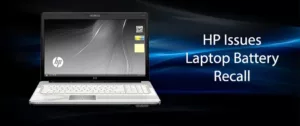HP just extended their battery recall and, if you have an HP laptop, you should take this recall very seriously. Lithium Ion, because it has an energy density around 1/4th of dynamite can be very dangerous. This danger is generally exemplified when you have a short and the battery dumps all that energy very quickly. It also, when ignited, burns hot enough to melt metals like aluminum. I experienced this myself when an electric bicycle battery failed in my garage and almost burned down my house. (I was lucky that I caught it relatively quickly, had extensive fire training, and had several of the right kind (chemical) fire extinguishers handy.
Over a decade ago there was a far larger battery recall and I was contacted by one PC vendor who wanted me to talk to another about doing an industry recall. The cause was metal in the Lithium Ion due to line contamination that was causing shorts and fires. The other CEO refused to do a recall because he believed his unique technology would prevent a fire. The following day one of his notebooks burst into flames nearly taking out a house and he did the recall. This showcases that while recalls are expensive the cost of not doing them can be catastrophic so when a vendor, like HP, asks you to test to see if your battery needs to be pulled you should do it.
Process
What is interesting this time is that HP thought they had a good idea which batteries had been compromised and so they created a tool that would both check to see if you had a damaged battery and then turn off the charger to it. Typically, this means the problem, unlike the prior instance, is due to inadequate heat dissipation during charging. This often happens when the battery cells are packed too tightly, and this was largely why the Samsung phones were catching fire. When you charge or rapidly discharge, a battery it can generate a lot of heat and if you can’t dissipate it effectively a cell may catch fire and then that fire will cascade to other cells making the fire impressively large and hot.
Once you run the application if your battery is found to be one of those effected by the recall you are sent a new battery and then an installer will contact you to replace it. Kind of makes you yearn for the days when batteries were user replaceable doesn’t it?
Once done you should be safe but there is one caveat and that is if the vender, in this case HP, finds there was additional contamination outside of the initial projection. Then they have to update the tool, have you run it again, and reconfirm you don’t have a problem. That is what is happening this time and if you have an HP laptop it is advised you download and run the utility to be safe particularly because this recall also impacts replacement batteries as well.
More information on this recall, as well as the download link for the application, can be found at the HP Battery Recall Site.
Wrapping up:
Battery Recalls are serious whether they are for Smartphones or PCs, but given the PC batteries are far bigger, complying with PC battery recalls is more critical. Because these batteries contain energy in line with explosives even the small risk they might catch fire represents a potential life or death exposure to anyone that has a compromised battery. As I personally discovered, these batteries burn hot and when one caught fire in my own garage it melted the screws in its steel containment case before catching a set of tires on fire and nearly burning down my house. I was lucky my instance was in a garage as, had this happened while I was sleeping in my bedroom my life would have depended on my fire alarm and things might have ended very badly.
Learn from my lesson and if you have an HP laptop download the application and if your battery is compromised make replacing it a priority. It won’t cost you and the life you save could be your own.








